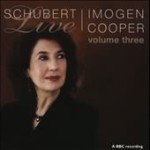If you like Schubert’s piano music served up with deliberation and profound sustaining power, abetted by the full coloristic resources of a modern concert grand, you’ll definitely warm to these live performances from the Queen Elizabeth Hall. Imogen Cooper uncovers an underlying sadness in the D. 790 group of German Dances, yet her songful phrasing allows no bleakness as she assiduously slips from one piece into the next. The A minor sonata stands out for Cooper’s disembodied legato effects in the slow movement, produced with a hundred shades of pedal. Although Cooper doesn’t quite capture Brendel’s offhand lilt in the B minor Hungarian Melody, her perfectly-judged tempos and well-balanced textures transform the unfinished two-movement C major sonata into a kind of extended song without words.
Cooper takes the first D. 899 Impromptu’s molto moderato directive to heart, yet she gives the impression of greater animation through powerful dynamic surges. The E-flat Impromptu is patrician and direct, while Cooper’s floating cantabile prevents her measured tempo for the G-flat Impromptu from wilting. Cooper arguably stretches the A-flat Impromptu’s middle section past the breaking point, but the rhetorical gestures and ruminative aura of the B-flat sonata first movement underline the music’s extraordinary harmonic byways. For similar reasons Cooper gets away with tapering the phrase endings in the slow movements.
In the Scherzo’s Trio section Cooper gives unusual and convincing emphasis to the right-hand upbeats, yet her energy flags in the Finale (the slightly labored dotted rhythms). A full-bodied yet darkly-lit account of the C minor Allegretto brings this collection to a close. This third volume of Cooper’s Schubert series may fall a bit short in relation to its superb predecessors, yet its finest moments invite repeated enjoyment. [1/4/2011]
































